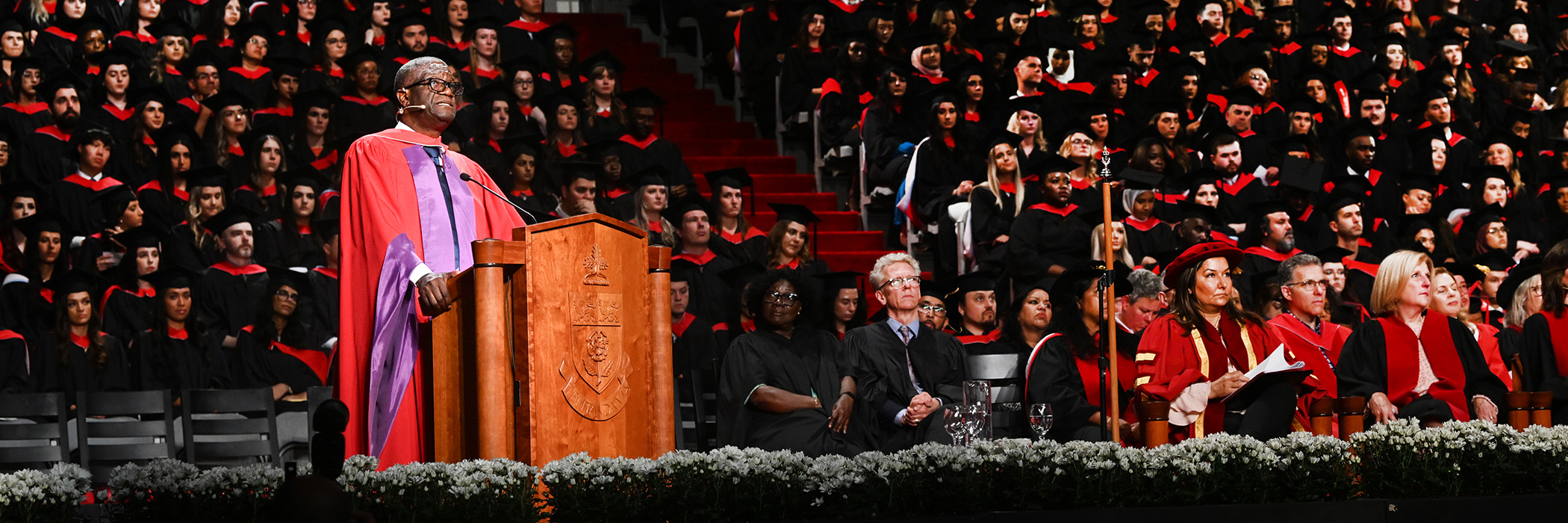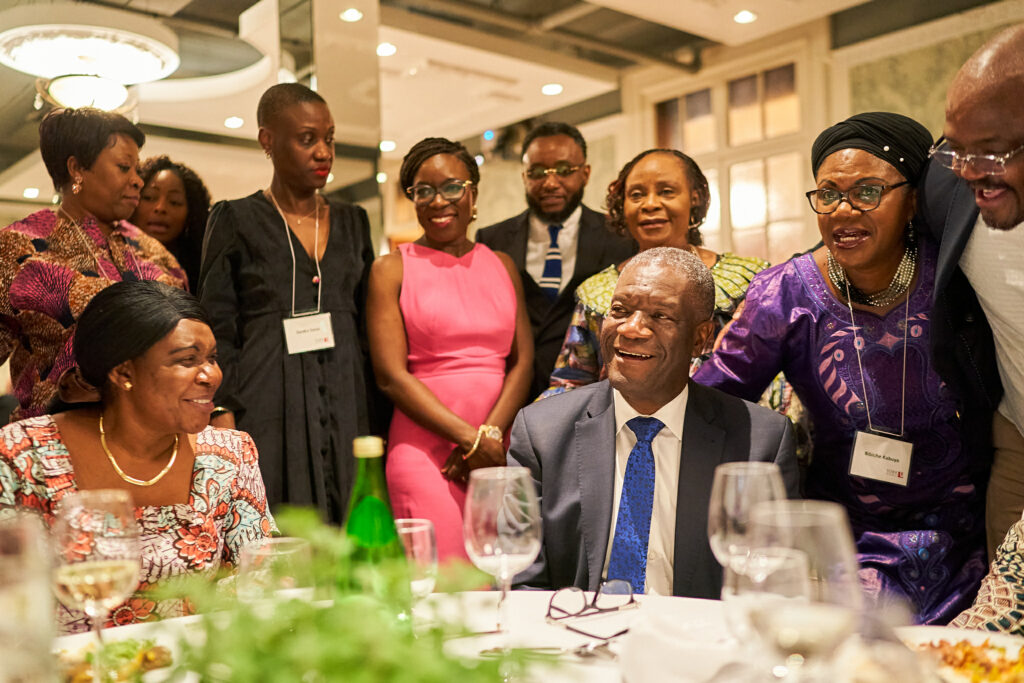Post
Published on June 20, 2023
Dr. Denis Mukwege, renowned obstetrician/gynecologist, Nobel Prize laureate and recipient of an honorary Doctorate of Laws from York University, called on Faculty of Health graduands to use their talent to fight injustice and care for those in need.

Mukwege received his honorary doctorate from the newly inaugurated York University Chancellor Kathleen Taylor, who opened the ceremony by addressing the graduating class, acknowledging the hope they represent. “Ladies and gentleman, as we look up today at the graduands of 2023, what we see are the future faces of the leadership of this country. May your successes be our successes in the decades ahead,” Taylor said.
Following Taylor’s remarks, Mukwege spoke to graduands, as well as their family and friends. (Mukwege’s speech was originally presented in French. The story below contains the English translation of his words).
An internationally recognized and decorated medical doctor, Mukwege began his career just as York’s Faculty of Health grads did, with endless potential, ambition and only a vague conception of what the future would hold. Mukwege spoke to the graduating class about the courage of the medical staff at his hospital in the Democratic Republic of the Congo (DRC), the resilience of the patients who are treated there, and the challenges of the Congolese people who continue to endure violence on a daily basis.

“From April 17 to April 30, 2023, Doctors Without Borders teams treated 674 female victims of sexual violence in displacement camps on the outskirts of the city of Goma, the capital of North Kivu, east of the Democratic Republic of Congo (DRC),” Mukwege explained. “That’s an average of 48 new victims per day. These figures illustrate the gravity of the humanitarian situation that currently exists in a region already martyred after 30 years of recurring wars.”
Beginning his education in the DRC, before pursuing studies in Burundi, France and Belgium, Mukwege became highly specialized in obstetrics with the intention of bringing world-class maternal care to his home, leading to his founding of Panzi Hospital in 1999. “Our goal was to reduce maternal and infant mortality in a region where many women still risk their lives giving birth,” he said.
As is common among fledgling professionals, Mukwege eventually found that the career he had envisioned and the work he was called to do differed dramatically. He realized that, despite his aspirations to help new mothers and deliver babies, the primary purpose of the hospital would be to serve as a critically important trauma and rehabilitation centre for survivors of extreme sexual violence. Scenes similar to those described earlier by Mukwege in the neighbouring province of North Kivu would also unfold at Panzi Hospital throughout its history.
Driven to put an end to such atrocities, Mukwege, Panzi Hospital and the Panzi Foundation have become leaders in developing specialized treatments for survivors of sexual violence. Mukwege’s patients “receive complete treatment in one place based on four pillars: medical-surgical, psychological, socioeconomic and legal,” with the goal of providing care that goes beyond mere treatment of physical injuries. This model has recently been replicated at hospitals in the DRC’s capital, Kinshasa, and in other countries enduring conflict, like Ukraine, where non-combatants – especially women and children – face the threat of sexual violence.
By implementing this model, the Panzi Hospital has allowed patients to “become masters of their destiny and change,” with many survivors eventually pursuing careers in law, nursing, social work, and in one case, anesthesiology.
Though he’d have struggled to imagine it at his graduation, the ever-evolving trajectory of Mukwege’s career led not only to the construction of his own hospital, but to the pioneering of a holistic care regimen, which in turn inspired patients to become doctors, nurses and legal professionals. A great deal of work remains to be done, but nevertheless, Mukwege’s mission demonstrates the chain reaction that is sparked when changemakers foster future changemakers.
“By awarding me these York University insignia, you are showing your solidarity with the Congolese tragedy, and you are helping to stir Canadian public opinion and decision makers to work for the return of peace to the heart of the African Great Lakes region,” Mukwege said.
Throughout his speech, Mukwege reminded the University and its graduands of the complexity of the fight for a better future and the importance of protecting human rights. Mukwege made clear that there can be no justice in pursuing a sustainable future without first raising up the various peoples around the world living in crises, like those in the DRC, where conflict is driven by competition for minerals needed to build green technologies developed in the Global North.
“We hope that this honorary doctorate will contribute to raising awareness among the academic world and the Canadian authorities and the Canadian people of the urgent need to pull the Congolese tragedy out of indifference and support the Congolese nation having the right to dispose of its resources and advance on the path of peace through justice,” Mukwege concluded.

In addition to the convocation ceremony at York’s Keele Campus, Mukwege attended a commemorative dinner at Glendon College, hosted by Principal Marco Fiola, Professor Gertrude Mianda and fellow Nobel Prize-winner Professor James Orbinski. The event also included 75 members of Toronto’s Congolese community.
The event marked many firsts for York University, being the first time that two Nobel Prize laureates had been hosted at Glendon College, and the first time that Toronto’s Congolese community had gathered there to welcome an esteemed countryman.
Originally published by Yfile (20 June 2023).
Themes | Global Health & Humanitarianism |
Status | Active |
Related Work |
N/A
|
Updates |
N/A
|
People |
James Orbinski, Director - Active
Gertrude Mianda, Faculty Fellow, Faculty of Liberal Arts & Professional Studies - Active |
You may also be interested in...
Global & Environmental Health Lab
As a top-tier research group, the Global & Environmental Health Lab is committed to developing cross-culturally validated resource insecurity tools including housing, good, energy, and water insecurity scales that can be used in most low ...Read more about this Project
Recap – Reflections from Nunavut to Personal Journeys on Identity and Culture
On February 7, 2024, Sara Ferwati, a community scholar at the Dahdaleh Institute, shared her insights on the intersection of climate change and mental health. Sara's presentation delved into how climate change impacts mental well-being ...Read more about this Post
Recap — Mindfulness Meditation at the Dahdaleh Institute
On March 1, the Dahdaleh Institute welcomed Susan Harris to lead members of the community in a Mindfulness Meditation session, the second instalment to a three-part Wellness & Self-Care mini-series. After a half-hour long guided ...Read more about this Post
